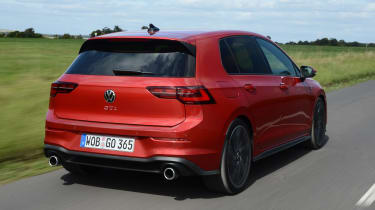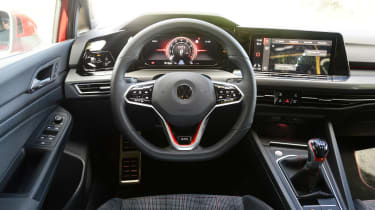New Volkswagen Golf GTI 2020 review
We sample the eighth generation Volkswagen Golf GTI hot hatch on British roads

Verdict
The new Volkswagen Golf GTI isn’t quite as thrilling to drive as a Honda Civic Type R or even a Ford Focus ST. But it has still more of the breadth of ability which, for many, defines the hot hatch genre, delivering a wider spectrum between comfort and performance-focused body control. As such, we think it’s a car we’ll be glad to recommend – especially when what are likely to be rock-solid resale values are translated into the monthly finance deals.
The Volkswagen Golf GTI was the original hot hatch, but in recent times it has not been the hot hatch. Rivals like the Honda Civic Type R have outshone VW’s icon by offering more extreme performance and handling, mixed with just about enough everyday usability. The stakes are high, then, for the Mk8 Golf GTI – and we’ve had the first chance to drive an example on UK roads.
Not that VW has panicked and ripped up the rulebook here, of course. As with pretty much every generation of Golf since the beginning, it’s a case of evolution. Like the new Audi S3, the Mk8 GTI uses the same basic MQB chassis as its predecessor. And it retains the engine, too – VW’s EA888 2.0-litre turbocharged four-cylinder unit.
But VW has given this standard GTI the same 242bhp as the Performance Pack version of the Mk7.5. There’s 370Nm of torque, too, and 0-62mph comes up in comfortably under seven seconds.
Used - available now

2023 Ford
Focus
20,134 milesAutomaticPetrol1.0L
Cash £16,495
2023 Toyota
RAV4 Hybrid
14,695 milesAutomaticPetrol2.5L
Cash £27,495
2022 MINI
3-Door Hatch
11,798 milesAutomaticPetrol2.0L
Cash £19,495
2022 Kia
e-Niro
74,997 milesAutomaticElectric
Cash £11,995There are further developments under the skin, with stiffer spring rates and new aluminium sub-frames, plus the locking differential from the limited-edition Golf TCR is now standard. The GTI also features something called Vehicle Dynamics Manager, which (like in the S3) controls both the diff and new adaptive dampers, adjusting them up to 200 times every second.
You can tell the difference, because the Mk8 GTI feels more alive than the outgoing model. It’s quicker to respond to steering inputs, with a more direct front end that bites into the asphalt if you really commit to a corner. It’s happier with sudden changes of direction as well – perhaps more so than any Golf since the (lighter) Mk5. The brakes are solid too, with good pedal modulation.
You control the adaptive dampers through a dashboard button, which brings up a menu on the central infotainment display, but cycles through the settings every time you press it anyway. Comfort is classic Golf GTI territory, with enough compliance to take the edge off the usual British road scars.
Sport sharpens the throttle response and weights up the steering, but it also firms up the ride to the point where you’re bumped out of the seat on rougher surfaces. Fortunately there’s also an Individual mode, which allows you to mix the punchier powertrain and heavier steering with a ride setting chosen from a sliding scale of firmness.
The powertrain, incidentally, feels, well, pretty much like a Mk7.5 GTI Performance Pack. There’s a bit of lag below 2,000rpm, but then the motor pulls strongly through to 5,000rpm. It sings more sweetly below 3,500rpm, though, with a strangely metallic rasp to it at higher revs. However, we’re not convinced the Golf feels as fast as either a Civic Type R or even a Focus ST.
This is our first experience with a manual-gearbox Mk8 GTI, having tried a dual-clutch automatic earlier in the summer. It’s a slick-enough unit and VW has clearly tried to shorten the throw a little compared with conventional Golfs. But it still feels a longer, more cumbersome shift than the Civic’s. The switching of a round gearknob to a square-ish one doesn’t help matters here either – the Honda’s metal ball feels better in the hand.
GTIs of old could count on the Golf’s cabin being a notch above anything else for the money, but that’s no longer the case. The tartan-trimmed bucket seats are excellent, but that aside it’s pretty much the same mix of finishes as on a regular Golf – and that means some hard plastics where you wouldn’t expect to find them.
The jury’s still out on the Golf’s digitalisation too, which has offered little scope for the GTI to feel ‘special’. Aside from a few different infotainment pages and extra red graphics, there’s not much to remind you that you’re in the hot hatch model. And you might find the relative shortage of physical switches even more of a frustration than in a regular Golf, particularly if you’re pushing along.
What you’re left with is a car that is not at the absolute bleeding edge of how hot a hot hatch can be. But then, you could argue that the Golf has rarely occupied that position. Its strength continues to be its duality – that ability to soothe away hundreds of miles in comfort before stiffening things up for a B-road or even a track day – mixed with everyday practicality and subtle performance car looks. And on those factors, its appeal has undoubtedly been enhanced.
| Model: | Volkswagen Golf GTI |
| Price: | £32,500 (est) |
| Engine: | 2.0-litre 4cyl turbo petrol |
| Power/torque: | 242bhp/320Nm |
| Transmission: | Six-speed manual, front-wheel drive |
| 0-62mph: | 6.3 seconds (est) |
| Top speed: | 155mph |
| Economy: | TBC |
| CO2: | TBC |
| On sale | Now |












